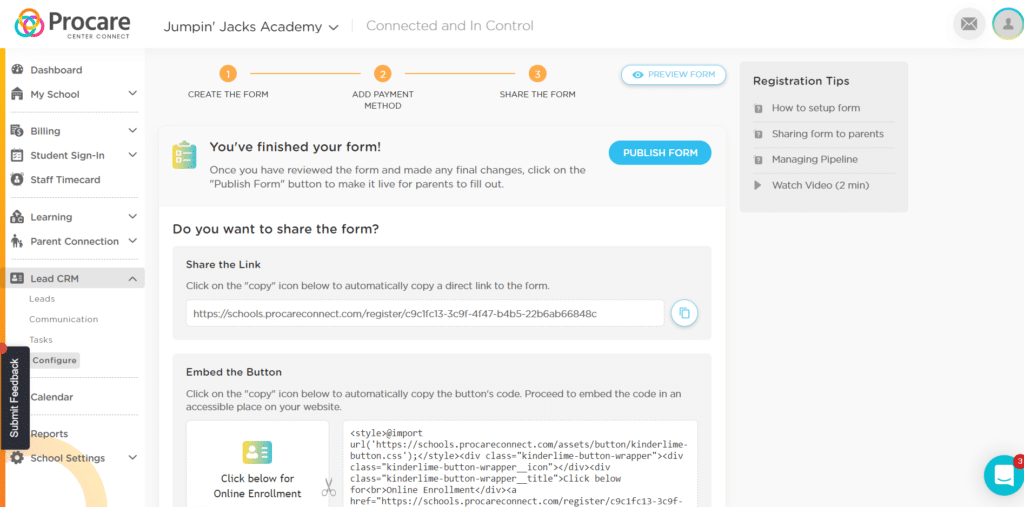
Running a child care center is both challenging and rewarding. At the heart of that challenge is that you need to effectively run a business while attending to children’s needs. The documents you use are an important way to optimize your practices and record-keeping, present a professional face to parents, and ensure the health and safety of every child.
Today, we’ll be taking a dive into six of the most basic forms every child care center needs to meet those objectives, and how you can get the most possible out of every form you use.
Let’s Talk Child Care Forms
Child care forms are the documents you create and maintain as you operate your child care center, and are important in making sure you’re in compliance with local, state and federal regulations. Child care forms help your organization retain vital information, protect you from liability, and establish shared understanding and expectations between your center and the parents who entrust you with their kids.
Using forms can sometimes feel like busywork, but well-organized forms can make your job a lot easier in the long run. When choosing what child care forms to use, take a systematic approach and think about how all your forms work together to create the records you need. For each form, try to find a balance between prioritizing the most important information and allowing for extra detail.
Making forms that are simple, complete and avoid redundancy is easier than it sounds and will maximize the potential of your child care business. A few basic documents are at the heart of your day-to-day operations. Read on to find out what they are, why they’re important and how to use them.
Six Forms Your Child Care Business Needs

Child Care Registration Forms
The success of your child care business is contingent on enrollment, so the first form you’ll want to focus on is a registration form. This form provides both your introduction to each child, and an introduction to your center for children and parents. It covers all the necessary details for every child: from name and date of birth, to medical information and allergies, and routines and preferences of the child and their family. (Check your state’s regulations for other mandatory inclusions on child care registration forms.)
The daycare waitlist application form is crucial for every child care center because it is the foundation of child-centered care, giving you important information to help you ensure a child’s individual safety and happiness. It’s also a great way to communicate your center’s policies and procedures to families.
Tip: To make your registration form as effective as possible, use inclusive language and provide a space for parents to write extra notes. This lets you capture everything important about each family, including those with needs you may not have anticipated.
Free Template
Daycare Application Forms
Looking for printable child care forms to use at your daycare center, preschool or similar child-centered business? Get your PDF copy of the application and registration form for free!
Meal Tracking Sheets
Meal tracking sheets are an important part of optimizing the health and nutrition of the kids you serve. At their most basic, they record what is served to each child and when. Tracking meals may seem tedious, but it’s necessary to comply with some state regulations and to get reimbursement under state and federal programs, such as the Child and Adult Care Food Program (CACFP).
This sheet should include each child’s name, date of birth, eligibility status for any relevant meal program, and precise meal counts. All of this information is important to receive reimbursement under CACFP and calculate which meals to claim. It also helps you effectively plan and budget meals, meet nutrition goals, monitor children’s food behavior, and provide important information in case of medical emergencies.
Tip: Using meal tracking software is the easiest and most efficient way to plan meals ahead of time based on scheduled attendance — this prevents both food waste and shortage.
Automatic Payment Authorization Forms
Let’s be honest — collecting tuition payments can be a huge hassle, from processing paper checks, to data entry, to checking for overdue payments and chasing parents to pay you. An easier way to make sure you get paid is by using automatic payments — and for that, you’ll need an automatic payment authorization form.
Automatic payments are a game changer because they take the middleman out of processing payments, improve payment security and support a reliable cash flow. You can process both ACH (direct debit) and credit card payments automatically. The form should include:
- A clear explanation of what is being authorized and agreed to.
- Name and billing address information, exactly as it appears on the account.
- For ACH payments, the institution name, account number and routing number. (Alternatively, a voided check can be attached to the form.)
- For credit card payments, the card type, credit card number and expiration date.
- A signature and date line to confirm authorization.
Tip: Offer incentives to make it easy for families to sign up for automatic payments. Free tickets for a raffle, discounted convenience fees and custom payment schedules are all ways to give parents the gentle nudge they need to sign up.
Daily or Weekly Sign-in Sheets
Keeping track of your kids’ attendance is one of the most important record-keeping tasks for your business. Billing, class scheduling, evaluations, regulatory compliance and child safety all depend on knowing where each child is every day. Two form options for keeping track of kids’ presence and absence are daily and weekly sign-in sheets.
The two main ways to keep track of attendance on paper are with a daily daycare sign-in sheet for each child, or a single sign-in sheet for an entire classroom. Per-child sheets are an easy way to aggregate data for each child, which is handy if you bill based on attendance. Per-room sheets are more streamlined and require less paper, but can be less flexible if your schedule varies.
No matter what form option you use, make sure it includes space foreach child’s name, the date, their sign-in and sign-out time, and any notes such as a reason for absence.
Tip: Digital attendance tracking and check-in offers the pros of both per-child and per-room sign-in sheets, and gives parents extra peace of mind by simplifying check-in.
Free Template
Daycare Sign In Sheets
Download a PDF of printable daily and weekly sign-in sheets from Procare.
Child Health & Safety Forms
Accidents and medical incidents can happen even at the safest of child care centers. Child health and safety forms are vital tools for documenting and communicating these events to parents. No matter how minor, every bump, scrape or upset tummy should be recorded.
Your health and safety forms should include the child’s name and date, specific details about the injury and how it happened. Write down any first aid that was used, such as bandages or medication, as well as who provided it. Makespace for the parent to sign the form to acknowledge their receipt of the report. Later on, if the injury has unexpected consequences or the child has a reaction to treatment, this information will help protect both you and the child.
Tip: Make two copies of every health and safety form to ensure that both the center and parents have records of any incidents.
Free Template
Child Care Emergency Contact Form
This child care emergency contact form template includes parent/caregiver information, other authorized emergency contacts and child medical information.
Daily Reports
Transparency and communication with parents are key to the success of any child care business. A daily report on each child is an important way to put parents at ease by letting them know what happens with their child each day at your center. This form also helps identify any issues that a child may be having that could fly under the radar otherwise.
Daily reports should cover the basics of eating, resting and (for younger kids) bathroom habits. They can indicate the child’s mood and behavior, and have a space where teachers and staff can put comments about the child’s day in case there’s anything special that needs to be added, such as extra good behavior or trouble sleeping. For older kids, you can add a little bit about what they learned that day and what learning domains were covered.
Consistent daily reports are one of the best ways to reinforce your center’s practices and values by showing attention to each child’s needs, as well as maintaining the flow of contact between parents.
Tip: Since kids at varying developmental stages have different needs and routines, it helps to use a different reporting form for each age group.
Free Template
Child Care Daily Report
Try our simple, reusable template customized for each age group, you can make your daily reports both easy-to-use and personalized to each child.
Digitize Your Child Care Forms with Procare Solutions

Paper record-keeping is time-consuming, prone to errors, and makes it difficult or impossible to leverage any of the data you capture. Paper records can also get lost, resulting in billing issues or penalties for poor compliance.
Procare Solutions delivers innovative child care technologies that can help you digitize your operations, improve record-keeping accuracy, and stay connected and in control of your child care business.
Procare makes it easy for centers to:
- Streamline the child care registration process with digital registration forms.
- Track child care attendance digitally with features like contactless check-in and check-out.
- Manage and automate child care billing and payments through a digital interface with multiple payment options for parents.
If you’re tired of endless data entry, using multiple forms for the same purpose, and wasting money on printer ink, it’s time to digitize your child care forms with Procare Solutions.



